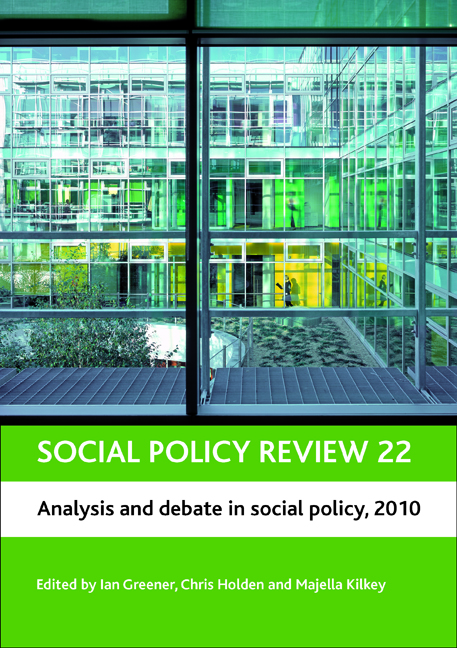Introduction
Published online by Cambridge University Press: 01 September 2022
Summary
Social policy faces difficult times ahead. The extraordinary debts that governments in developed nations have acquired since 2008 in order to try and deal with the financial crisis must be paid back, and the public spending deficits that they have created are becoming the source of considerable vexation. As I write this in January 2010 it seems that while the banking sector, where much of the crisis originated, is making substantial profits again, with the return of bonuses to bankers despite the anger expressed towards them by President Barack Obama and the British Chancellor Alistair Darling, welfare states across the world are facing a period of retrenchment and budget cuts.
The financial crisis appears frequently throughout this collection, which has three main sections. First there is a review of policy, structured around contributions from four leading writers in their areas who looked back over Labour policy in the UK since 1997; 2010 is an election year, so it is a good time to review Labour's approach to social policy in four key areas, as well as starting to look to the future to imagine what/who might come next. After these reviews comes the Social Policy Association's (SPA’s) best postgraduate paper winner from 2009, before moving on to Part Two, current issues and debates. This section contains a mix of chapters, with two directly addressing the financial crisis, one that considers modern slavery and one that looks at reform in a developing country. Together they form an overview of the diversity of scholarship in social policy. Finally Part Three is a themed section on service user involvement which includes five contributions examining this issue, one that is central to thinking about social policy organisation in both present policy and in the future. Once again there is a premium on the diversity of scholarship, with outstanding work that examines the issues in getting users involved and engaged with policy from a range of perspectives.
Part One: Current developments– Ian Greener
The central theme of Social Policy Review (SPR) this year was to ask, in four key policy areas, what Labour have achieved since 1997, and then to look forward to what might happen next.
- Type
- Chapter
- Information
- Social Policy Review 22Analysis and Debate in Social Policy, 2010, pp. 1 - 10Publisher: Bristol University PressPrint publication year: 2010

